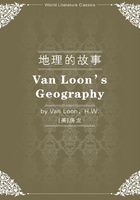
28.Hungary, or What Remains of It
THE Hungarians, or Magyars, as they prefer to call themselves, are very proud of the fact that they are the only people of Mongolian origin who were able to maintain themselves on European soil and to found a kingdom of their own, for their distant cousins, the Finns, were until very recently always a part of somebody else's empire or kingdom. Perhaps the Hungarians in their present misery have stressed their great warlike qualities a little more than was strictly necessary.But no one can deny that as a bulwark against the Turks they have rendered a tremendously important service to the rest of Europe.The Pope recognized the value of this buffer state when he raised the Magyar chieftain, Stephen, to the rank of Apostolic King of Hungary.
For when the Turks overran eastern Europe, it was Hungary which kept them within bounds. They were the first barrier, as Poland was to prove the second when Hungary at last was overrun.Under the leadership of one John Hunyadi, a humble nobleman of Vladic origin, Hungary became in truth one of the few defenders of the faith who was entitled to that name.But those same wide plains on both sides of the Tisia and Danube, which had so greatly attracted the Tartar horsemen that they had decided to settle down for good were to prove the source of many internal evils.
Wide open spaces make it comparatively easy for a few strong men to dominate their neighbors. For where can the poor peasants go when there is neither sea nor mountains?Hungary therefore became a country of large land-owners.Far removed from the center of government, the land-owners maltreated their peasants so outrageously that soon the latter cared very little whether they were Magyar or Turk.
When Sultan Suleiman the Great marched against the West in the year 1526,the last of the Hungarian kings could not collect more than 25,000 men when he tried to stop the Mohammedans. On the plain of Mohács this Hungarian army was completely annihilated.Twenty-four thousand out of a total of 25,000 perished.The King himself was killed, together with all his advisers, and more than 100,000 Hungarians were dragged back to Constantinople to be sold to the slave-dealers of Asia Minor.The greater part of Hungary was annexed to Turkey.The rest was occupied by the Austrian Habsburgs who then began a tug of war with the Mohammedans for the unhappy land until the beginning of the eighteenth century when all of Hungary became part of the Habsburg domains.
Then, however, a new struggle for independence was started, the war against the German masters, and it continued for two entire centuries. The Hungarians fought with reckless bravery, and at last they were able to achieve a semblance of independence by recognizing the Emperor of Austria as Apostolic King of Hungary, and acquiring the status of a dominion.
But no sooner had they obtained what they considered merely to be their own good right than they must start upon a policy of persecution against all those who were not of Magyar blood. This policy was so short-sighted and deprived of common sense that soon they were without a friend in the whole wide world.They noticed this during the Congress of Versailles, when the number of inhabitants of the ancient Apostolic kingdom was reduced from 21,000,000 to 8,000,000 and threefourths of all its former territory bestowed upon deserving neighbors.
This left Hungary a mere shadow of its old glorious self, a state not unlike Austria, one big city without any hinterland. Hungary was never very much of an industrial country.The large land-owners had had a prejudice against those ungainly chimneys that are an indispensable part of all well-regulated factories and they had not cared for the smell of smoke.As a result the Hungarian plain remained available for the purposes of agriculture, and Hungary today has the highest percentage of agricultural land of any country.Since most of this has always been under cultivation, the people should have been comparatively well off;yet the prevailing poverty has been so great that between 1896 and 1910 the country lost almost a million inhabitants through emigration.
As for the subject races of the old kingdom, the Magyar minority knew so well how to make its subjects uncomfortable that they too moved away by the boatload and the train, to help in the development of our own nation. We may as well give you a few figures, for what happened in Hungary happened to a lesser extent in practically all those countries where a small class of hereditary landlords had succeeded in making themselves supreme.
Just before the beginning of the Turkish wars of the sixteenth century, the Hungarian plain was densely populated and had more than 5,000,000 inhabitants. The Turkish domination reduced that number to 3,000,000 in a little less than two centuries.When finally the Austrians had driven the Turks away from the Puszta(the Magyar name for the plains),Hungary was so sparsely populated that immigrants from all over central Europe hastened to occupy the deserted farms.But the Magyar nobles, considering themselves the dominant race, the fighting race par excellence, would grant unto those newcomers none of the rights which they themselves enjoyed.The subject races, therefore, who accounted for almost one-half of the total population never were able to feel any real affection towards their adopted country.
Was it any wonder that during the Great War they felt a lack of inner loyalty which in the end caused the dual monarchy to crumble to dust, like an old building shaken by an earthquake?